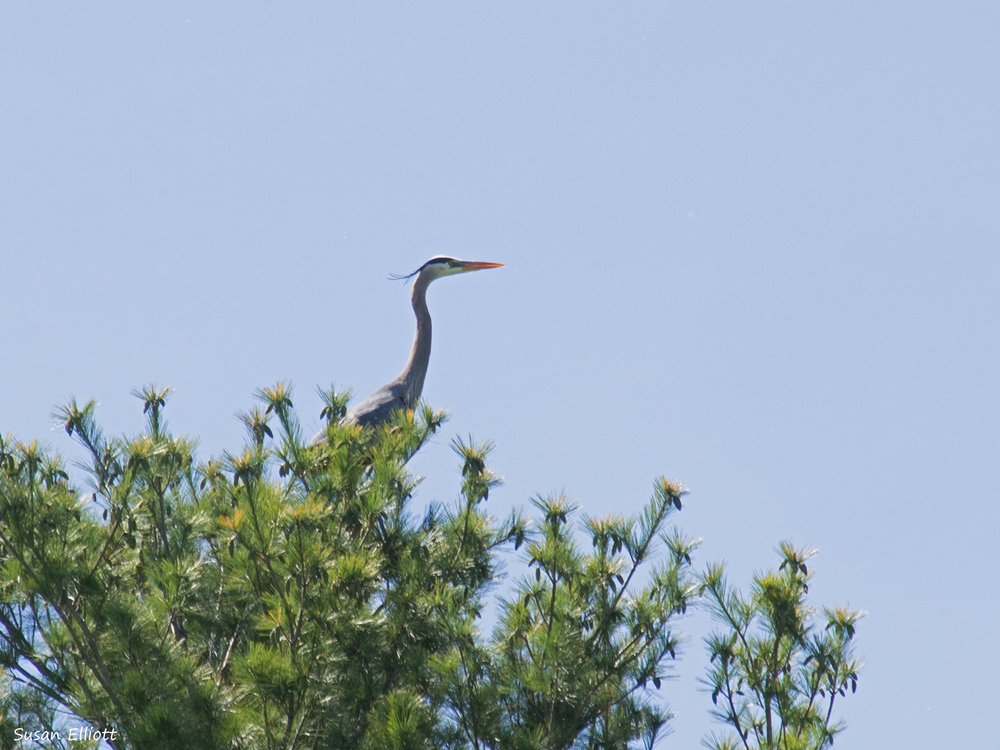 102! We broke a ‘century’ again for RCAS’s annual attempt to tally 100 species or more in Rutland County. The dawn light was beautiful, but quite chilly. Extra layers and gloves were appreciated until late in the morning.
102! We broke a ‘century’ again for RCAS’s annual attempt to tally 100 species or more in Rutland County. The dawn light was beautiful, but quite chilly. Extra layers and gloves were appreciated until late in the morning.
We started the count, as we always do, at West Rutland Marsh. As the sun rose, the morning chorus increased. Willow and alder flycatchers returned this week, adding their voices to the marsh wrens, yellow warblers, common yellowthroats and swamp sparrows that have already returned and claimed their territories. Virginia rails were heard and an American bittern flew across the marsh. Two green herons were seen in flight and then perched, giving us good views.
The Pleasant Street power line was still in the shade when we arrived. The rising song of the two prairie warblers was heard (with a few of us catching glimpses of this beautiful bird). However, we did not hear the downward bouncing ball song of the field sparrow. A wood thrush sang in the nearby woods while eastern towhees invited us to ‘drink our tea’ (a warm cup would have been nice at that point). Over the breeze, we managed to pick out the songs of Nashville warbler, chestnut-sided warbler and blackpoll. A single eastern bluebird was perched on the wire.
 Great Blue Heron at Bomoseen State ParkThe Canada warbler singing on Thursday’s marsh monitoring walk was still singing along Whipple Hollow Road. Another blackpoll was heard as well as a northern waterthrush and another wood thrush.
Great Blue Heron at Bomoseen State ParkThe Canada warbler singing on Thursday’s marsh monitoring walk was still singing along Whipple Hollow Road. Another blackpoll was heard as well as a northern waterthrush and another wood thrush.
The Route 4 rest area and Blueberry Hill WMA was a bonanza of warblers. Adding ticks, both to checklists and pant legs, was the theme here as this spot is probably the ‘tickiest,’ as in insect spot in the state. But the birds more than make up for it. An unexpected highlight was a bay-breasted warbler near the start. A Tennessee warbler attracted us with its three-part ‘typewriter’ song and a magnolia warbler was also singing.
Walking east on the trail, we encountered a high number of American redstarts and ovenbirds as well as three Blackburnian warblers and a black-and-white warbler. Two cerulean warblers were heard along the way with one seen by two birders. An overgrown field on the eastern side of the rest area had Canada, blackpoll, northern parula, chestnut-sided and yellow warblers. Thank goodness for bird song as the trees leaf out! Other birds encountered were Baltimore oriole, scarlet tanager, rose-breasted grosbeak, wood thrush and yellow-throated vireo.
Moving on to Crystal Beach on Lake Bomoseen, we picked up ring-billed and herring gulls, a common merganser, two common loons and three double-crested cormorants. An adult bald eagle sat at its usual spot on the tallest white pine on Neshobe Island. Had this been a warmer day or Memorial Day weekend, boat traffic probably would have made seeing these species more difficult.At nearby Love’s Marsh, we added a singing brown creeper and two yellow-rumped warblers. A pair of wood ducks flew across the marsh.
Along Black Pond and Moscow roads in Hubbardton and Castleton we saw or rather mostly heard black-throated blue and black-throated green warblers along with more yellow-throated vireos, ovenbirds and redstarts. We finally saw a ruby-throated hummingbird!
At a stop at Bomoseen State Park, we finally heard an eastern wood-pewee and added a chipping sparrow and purple finch. A pair of Canada geese guarded eight young.
A last pass along Lake Bomoseen yielded us a Louisiana waterthrush at the Kehoe Fishing Access. Unfortunately, the blue-gray gnatcatcher was a no-show.
Moving west in the county we picked up some grassland species. Bobolinks were bubbling and three killdeer were spotted at Fair Haven Airport. Along Main Road in West Haven more bobolinks were singing as well as eastern meadowlarks. An American kestrel and a dust-bathing wild turkey were also seen.
Two silent savannah sparrows were seen along Ghost Hollow Road. We heard the wheezy song of a blue-gray gnatcatcher along Cogman Road in West Haven and finally spotted the small bird.
We moved on to the Buckner Preserve which entailed a brief trip through New York State. At last we saw an osprey, but couldn’t count it! Fortunately, we saw two at Buckner. More prairie warblers, counted during the start of our day, were heard again. Other highlights at this spot were a nesting red-tailed hawk and another Louisiana waterthrush. We heard the ‘bees buzz’ of a winged warbler so that one went on the list as “golden-winged warbler/blue-winged warbler.”
Odd misses or low numbers today: No downy woodpeckers, no pine warblers, no ruffed grouse, one indigo bunting and that one only giving its ‘spit’ call, two white-breasted nuthatches and few raptors. The hits, however, more than made up for it!
It was a great day to be out and about in Rutland County. Many thanks to all the eyes and ears that made 102 species possible!
Today's list (20 checklists submitted to eBird):